Jennifer Lauck's Blog, page 28
March 12, 2011
GATE GATE PARAGATE PARASAMGATE BODHI SVAHA
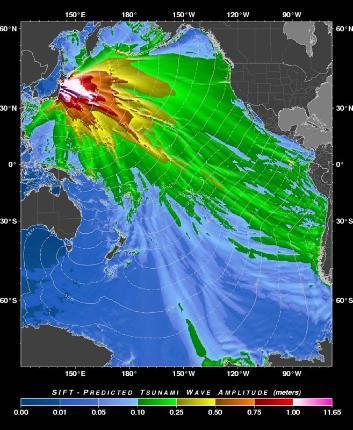 My heart breaks for the people of Japan and for all of us as we awaken to this new day after such a massive earthquake and tsunami. The waves are still being felt around the world and more so with the overheating and melting down of a nuclear power plant. Why do we have these damn power plants anyway? Not only is the natural phenomenon going to cost dearly but now the man made idiocy will cost so much more. When will awaken? When will we make good choices for ourselves, each other, the planet and life itself?
My heart breaks for the people of Japan and for all of us as we awaken to this new day after such a massive earthquake and tsunami. The waves are still being felt around the world and more so with the overheating and melting down of a nuclear power plant. Why do we have these damn power plants anyway? Not only is the natural phenomenon going to cost dearly but now the man made idiocy will cost so much more. When will awaken? When will we make good choices for ourselves, each other, the planet and life itself?  As a woman of action, I know it will do no good for my own heart or the people of Japan to simmer long in rage and rhetoric. The Dalai Lama calls for those who do mantra or prayer to pray the Heart Sutra for the people of Japan as well as the earth. So I'm on it. The mantra of the Heart Sutra is so beautiful and so easy to get on line--please read about it and just sit still, close your eyes and offer a hundred prayers up for calm, peace and freedom for this crazy time on our planet and for the people of Japan.
As a woman of action, I know it will do no good for my own heart or the people of Japan to simmer long in rage and rhetoric. The Dalai Lama calls for those who do mantra or prayer to pray the Heart Sutra for the people of Japan as well as the earth. So I'm on it. The mantra of the Heart Sutra is so beautiful and so easy to get on line--please read about it and just sit still, close your eyes and offer a hundred prayers up for calm, peace and freedom for this crazy time on our planet and for the people of Japan.The prayer has many translations: Gone, gone, gone beyond, gone altogether beyond, O what an awakening, all hail!
The Dalai Lama says this: go, go, go beyond, go thoroughly beyond, and establish yourself in enlightenment.
It doesn't matter how you say it, just say it and be still and send compassion to the world and Japan. It helps. We are more powerful than we know. Love is more powerful that we know.
If you do this prayer, send me a count and we'll add up the prayers. I've got two hundred to put into the pool!
March 11, 2011
Book Talk: Fidelity By Wendell Berry
 Wendell Berry is a master storyteller, essayist and poet. Look him up in Wikipedia and do some addition on the number of published works in all categories, including awards and fellowships (both Guggenheim and Rockefeller). The man is prolific indeed. Berry is a writer's writer, a reader's writer and everything in between.
Wendell Berry is a master storyteller, essayist and poet. Look him up in Wikipedia and do some addition on the number of published works in all categories, including awards and fellowships (both Guggenheim and Rockefeller). The man is prolific indeed. Berry is a writer's writer, a reader's writer and everything in between.I particularly love Fidelity, which is five interconnected short stories that plunk the reading into the middle of the lives of the Port William community with little preamble. You'll feel like you're sitting in Hannah's kitchen listening to family stories or, more likely, following her around and helping with chores. Fidelity is a quick read and introduction. My guess is you'll want more. And yes the title pays off. Each story touches on the thread of fidelity—a deep faithfulness between the people and land.
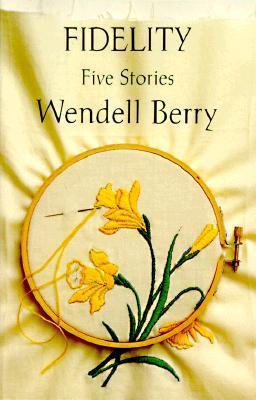 In one of the Fidelity stories, Danny steals Burley out of the hospital so that Burley--who's 82 and dying—can die away from the "mechanical room, in the merciless light" with tubes running in and out of him. Danny is a do-it-yourself guy who's guided by his heart and doing what's right. He knows better than to waste time arguing with doctors to get Burley discharged. Instead, he goes to the hospital in the middle of the night, unhooks the comatose Burley from all the monitors, lays him on a gurney, covers him with a sheet and scoots him out the emergency entrance.
In one of the Fidelity stories, Danny steals Burley out of the hospital so that Burley--who's 82 and dying—can die away from the "mechanical room, in the merciless light" with tubes running in and out of him. Danny is a do-it-yourself guy who's guided by his heart and doing what's right. He knows better than to waste time arguing with doctors to get Burley discharged. Instead, he goes to the hospital in the middle of the night, unhooks the comatose Burley from all the monitors, lays him on a gurney, covers him with a sheet and scoots him out the emergency entrance.Danny takes Burley to an old barn, deep in the woods that's been shelter for the two of them when hunting and fishing.
Burley wakes up once. Danny asks if he knows where he is and Burley tells him, " Right here." Danny asks Burley if he wants anything and Burley tells him, "Drink." So Danny heads to the spring to get Burley water:
When he returned, Burley's eyes were closed again, and he looked more deeply sunk within himself than before. It was as though his soul, like a circling hawk, had swung back into this world on a wide curve, to look once more out of his eyes at what he had always known and to speak with his voice, and then had swung out of it again, the curve widening. Danny stood still, holding the can of water. He could hear Burley's breaths coming slower than before, tentative and unsteady. Danny listened. He picked up Burley's wrist and held it. And then he shouldered his tools and went up into the woods and began to dig.
This death scene moved my heart and inspires me to pull nature into my own writing when I'm trying to get at those huge life and death moments. In Berry's imagery, there's no need for elevated language or misplaced sentimentality. The hawk--watching, circling, curving--does all the work necessary.
March 9, 2011
On the Road: Seattle
Seattle's Magic Mar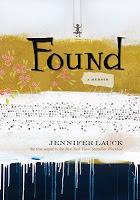 ket is not why I'm going to Seattle on a Wednesday morning, no. I'm going to speak at my second "live" event as part of the promotions for Found: A Memoir. I'll be at Elliot Bay Books tonight at 7:00 p.m. and then back on the following Wednesday to do
ket is not why I'm going to Seattle on a Wednesday morning, no. I'm going to speak at my second "live" event as part of the promotions for Found: A Memoir. I'll be at Elliot Bay Books tonight at 7:00 p.m. and then back on the following Wednesday to do
March 7, 2011
Fresh Writing: Super Daughters, Super Powers
My daughter is ni
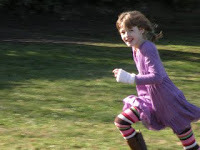 ne and has a scream that will make your ears bleed. She also can run so fast she will become a blur of elbows and knees in three seconds flat. "These are your super powers," I tell her.
ne and has a scream that will make your ears bleed. She also can run so fast she will become a blur of elbows and knees in three seconds flat. "These are your super powers," I tell her.
My girl, who has a quick mind, says, "And they are good ones, too."
Indeed, they are. And she has plenty more; in fact, she has power to spare, but as my girl approaches adolescence and the mindboggling amount of social and cultural pressure to look and behave in very limiting ways, I am increasing my vigilance around this subject of her empowerment.
This is the era of feminine power. The Chinese calendar tells us so, as it makes a flip from a 5,000-year-long masculine cycle known as "Yang" to a new 5,000-year cycle known as "Yin." At the Vancouver Peace Summit in September 2009, the Dalai Lama announced that he is a feminist and opined that Western women will save the world. I do not disagree. Just look at our friend Oprah, leading the charge as number six on the Fortune 500 Most Powerful Women List, and Arianna Huffington, who has given voice to so many women via this medium..
Western woman are free, educated and have opportunities that most women around the world can only dream about.
The question becomes this: How do we western women, so often raised by unempowered mothers, make a necessary shift in our thinking and our actions in order to gift our daughters with a full inheritance of feminine power?
For me, the answer has been two-fold. One, I have gotten to know myself very well. Two, I have brought about change in my attitudes and actions.
For almost 20 years, I have investigated every nook of my conditioned history. This is the "getting to know myself" part. I am a daughter, born in the '60s, and while so many women of that era were burning their bras, experimenting with birth control, exploring mind altering drugs and getting higher educations, my adoptive mother -- a product of the '40s and '50s -- made a point to put her makeup on and do her hair just so, even as she was dying from a tumor lodged in her spine. "A woman doesn't make a fuss," she liked to say, taking copious quantities of aspirin to mask her pain. She died when I was seven, and I'm pretty sure that if she spoke up a little sooner she may have lived.
Further back, my original mother -- 17 when I was born -- had been forced to give me up for adoption, against what was legal and even moral. My original mother, a beautiful woman in her own right, allowed herself to be silenced for all of her life, too, because that is how she had been raised.
From my long personal investigation, I have deducted that being silent, compliant and merely beautiful are not traits I intend to pass down. And this leads to the "change" part. Only with consciousness can a person awaken to make new choices, and this awareness happens by looking at one's history very carefully. As it is Woman's History Month for all of March, I invite all my western sisters to study what we have inherited -- both good and bad -- from our mothers, our grandmothers and even our great-grandmothers.
In my own genetic history, I found that I hail from a line of silent and ineffective women, but these same women have also had moments of remarkable strength and accomplishment. My great-grandmother was one of the first women to graduate from the University of Nevada, and my grandmother ran her own businesses for years.
I pass this story, and many more, down to my daughter and make a point to show her where she is strong and capable in her own right -- thus our recent conversation about her super powers.
I want my daughter -- as a free, educated and powerful western woman -- to be strong, bold and to know she is a force of nature to be reckoned with. I want her to be a woman who loves well, touches others with care and knows how to do what is right -- for herself and for the world she lives in.
March 4, 2011
Book Talk: Safekeeping By Abigail Thomas
writer, mother, teacher
& all around STH (super terrific human).
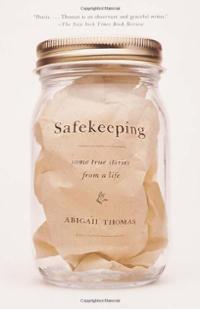 Safekeeping is a beautiful and poetic memoir by Abigail Thomas who must have gotten her "Less is more" memo, stuck it on her bulletin board and reread it while writing this spare book. Thomas gives us glimpses of her life—pregnant at 18, married, single with three children at 26, divorced, widowed and all the emotional terrain of each of these enormous chunks of life. Her writing is simple and profound and funny and brutally honest.
Safekeeping is a beautiful and poetic memoir by Abigail Thomas who must have gotten her "Less is more" memo, stuck it on her bulletin board and reread it while writing this spare book. Thomas gives us glimpses of her life—pregnant at 18, married, single with three children at 26, divorced, widowed and all the emotional terrain of each of these enormous chunks of life. Her writing is simple and profound and funny and brutally honest.
Thomas writes mini scenes from her life and tells her story in flashcards. Each moment is a page, sometimes less, sometimes more. What she leaves out tells us as much as what she includes.
In "A Present" Thomas writes:
What is this, my sister asks again.
It's an explanation, I answer.
An explanation?
It's an apology, I say.
An apology?
It's a present, I say.
There's no fluff or waste in Thomas' word choices. I love that about her writing.
In my own writing, I find the places I struggle with the most are often the places that need to be cut. It can be that simple. As writers we get so attached and why not? After all, we came up with them, connected them together like some many Lego's and we think they're…well…beautiful. But sometimes the delete button can be our best friend. From my own experience, I have learned to use it more often.
When something bogs down a piece of your writing, try pulling it out. Try Thomas's minimalist style. See what you think and of course, reading Safekeeping is a necessity for a memoir writer.
In your own writing process, have you also found that "less is best?" Share your comments here!
March 1, 2011
Release Day!
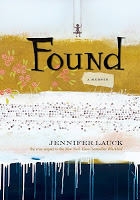 Found is officially out today even though I have been getting emails from all over the country, prior to this date. I am so happy to have made it to this point, to have the book out and readers reading.
Found is officially out today even though I have been getting emails from all over the country, prior to this date. I am so happy to have made it to this point, to have the book out and readers reading. As an update, my mother and I are doing just great. The reunion between us--which had those normal jitters and bumps and confusions--is now on solid ground. I love that I have the amazing opportunity to know her, hear her story and be with her as much as possible. She is my mother. I am so happy to have one! It's a slow, careful, gentle process that takes time but the two of us are "in it."
Keep posted to the site for events and teachings and don't forget to go to The Nervous Breakdown for the most hilarious interview I've given to date.
February 27, 2011
Annoucements: Classes, Appearances & Media
 I've just scarfed a eggy burrito & a two day old jammer from Grand Central, drank cold coffee, had a "conflict in need of resolution" with my poor besieged "YOU'RE NOT DOING ENOUGH TO HELP ME" spouse, tearfully dropped my daughter with her dad for two days and am finally, FINALLY sitting down to get caught up on 12 hours of work for which I have about five. Taxes, a blog post, busy work and more!!! I will be here, working until midnight tonight but damn straight I will write these announcements.
I've just scarfed a eggy burrito & a two day old jammer from Grand Central, drank cold coffee, had a "conflict in need of resolution" with my poor besieged "YOU'RE NOT DOING ENOUGH TO HELP ME" spouse, tearfully dropped my daughter with her dad for two days and am finally, FINALLY sitting down to get caught up on 12 hours of work for which I have about five. Taxes, a blog post, busy work and more!!! I will be here, working until midnight tonight but damn straight I will write these announcements. 1) Go to The Nervous Breakdown Website, right now if not sooner and check it out. They are so great over there, thanks to the heavenly (and hilarious Quenby Moone), I am featured all week as the Non-Fiction writer of the day or week or something. I don't know but I am on my knees bowing my thanks. This site is HOT.
1) Go to The Nervous Breakdown Website, right now if not sooner and check it out. They are so great over there, thanks to the heavenly (and hilarious Quenby Moone), I am featured all week as the Non-Fiction writer of the day or week or something. I don't know but I am on my knees bowing my thanks. This site is HOT.2) The Spring Craft Class is happening and YES, I am teaching with Anne Gudger (who has been doing the Friday Book Talk segments while I'm promoting Found). Anne is writing a stellar memoir on the heartbreaking death of her beloved husband three months before their first child was born and has taught writing for thirty years. When I need teaching tips, I go to Anne. Enough said. So come, sign up, have fun.
You'll leave with 20+ new ideas to bring fresh life into your writing. It's creativity and craft combined. And if you don't also leave this class 150% clear on how to create a powerful scene, I'll give you your money back...okay, no, I won't do that...but I will be heartily disappointed. Learning how to write a scene that rocks is more than half the battle. Once you get this, your writing will go through the roof.
April 4 to May 30th, Monday evenings 5:30-8:00 p.m. Cost is: $375.00 First come, first serve, we close the class at 20 peeps. You can sign up with me @ jennifer@jenniferlauck.com or via Pay Pal (scroll down & look right).
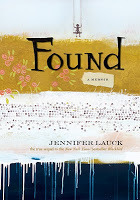
3) We are closing in on the Found book tour. Media is being set, event dates are set (look right) and I am coming to your city (if you are in the NW). I have a challenge for you. Bring me a joke, that makes me laugh (DO NOT EMAIL YOUR JOKES) and if I belly laugh, that's me bent over, clutching my side, a real full on gut buster, you will win a FREE CD. Free. So be sure to come to the readings and let me hear your great joke. After eighteen years on the road of my sad life story with a truly happy end, it's time to laugh. A lot!
February 25, 2011
Book Talk: Another Bullshit Night in Suck City By Nick Flynn
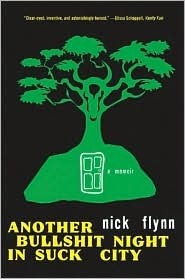 Contributed by Anne Gudger, teacher, writer, mother
Contributed by Anne Gudger, teacher, writer, motherAs a writer, what intrigues me most about Flynn's memoir is the structure and they way he dovetails his past and present. This guy, like a dealer in a Vegas casino, shuffles the story of his growing up life into his adult life, his own story with his father's story and his childhood with his adulthood, with remarkable skill. And he doesn't explain a darn thing.
Suck City is about Nick, who's a caseworker in a homeless shelter in Boston and his father, Jonathan, who's an alcoholic, homeless ex-con, deadbeat dad and self-proclaimed poet. Jonathan disappeared from Nick's life when Nick was a boy and surfaced only through letters and stories. Adult Nick meets his father at a shelter: son as caseworker, father as homeless man.
Ouch.
On the first page, Flynn describes his dad pretending to make ATM "deposits" in order to get out of the cold. Later he writes, "I see no end to being lost . . . You can spend your entire life simply falling in that direction. It isn't a station you reach but just the general state of going down."
 I love Flynn's barebones story telling. I love the lack of hyperbole. I also love how he never asks for the reader's pity, maybe just a little understanding. This kind of no nonsense style reflects in the structure too. The book is written like a series of snapshots where connective tissue is sometimes assumed. I felt like I was holding a flipbook and watching Nick grow up alongside his unstable father as the stories collide.
I love Flynn's barebones story telling. I love the lack of hyperbole. I also love how he never asks for the reader's pity, maybe just a little understanding. This kind of no nonsense style reflects in the structure too. The book is written like a series of snapshots where connective tissue is sometimes assumed. I felt like I was holding a flipbook and watching Nick grow up alongside his unstable father as the stories collide.In studying with Jennifer, questions of framing and what's most interesting about memoir frequently come up. In writing my own story of being widowed at 28 while I was pregnant, I struggle with how much of my childhood to reveal. Childhood traumas and how I learned to hold things in as a girl effected how I grieved as a young woman. I've spent the past two years plus writing my widow stories and my childhood stories and wondering if I can be the master shuffler that Flynn or if I have two books instead of just one.
Flynn's book shows me one possibility of how to write my adult story while letting my young stories flush me out as a narrator. If you have the same big question I do: one book or two? Try Another Bullshit Night in Suck City. Or if you're looking for a memoir that is heartbreaking but not sentimental, experimental and not traditional, my suggestion is the same: Another Bullshit Night in Suck City.
And how could I write about this book without saying something about the title? I can't resist: It's not bullshit and it doesn't suck.
February 23, 2011
Countdown to Publication: One Week!
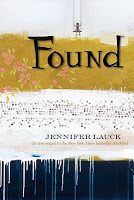
The days are not days. They are blurs of days. From dawn until way past dark, I am eating, drinking, dreaming and talking about Found, which officially releases March 1st. The schedule of readings is up on my site, I've created and launched my audio book on memoir teaching (which I will be using as a free give away promo during the tour), I am setting up my teaching schedule for this spring, summer and fall, and I am connecting and cross connecting between my adoption support community and my writing community and my teaching community and last, I am writing up a storm for networking blogs like this.
It's mayhem. Total can complete mayhem. And that's to be expected. It's a book release, right?
As I create this final countdown post, I reflect on what I have done—in this process, from creation to release—that has mattered the most. I also have pulled together a few nuggets of wisdom that might be helpful as you continue on your own writing journey beyond this post.
What mattered most is that I wrote Found (and the three books that came before Found). It matters that I stayed the course with my own deep questions about life, truth, mother and happiness. I knew so little about these things before I began at the tender age of 29 and have learned so much. These lessons will last a lifetime and I am honored to have an ancient storyteller living within me who drove me to work hours and hours a day, for eighteen years of my life. I am also very pleased I did not listen to naysayer's who shouted doom from the side of the road. I wavered but never forsake myself. Bravo!
What I would recommend to you, fellow writer?
Stay Your Own Course. Doubt, fear and worry are exit doors that will only lead away from your creations. Kick all small-minded thoughts out those doors and bolt them closed.
WHEW!
This whole social networking thing may feel awkward but that's okay. Surf anyway. Follow the energy. Connect. Say hello. Drop your fear and try it out. Remember human beings are on the other end of these forums and we all want to connect. Be friendly, be real and be helpful. Share yourself and you'll see. It works out.
Come see me on the tour, in Portland, Seattle and the Bay Area. Come take a class. Send an email. Twitter me, join the Fan Page on Facebook or say hello in Chicago at AWP next year. Where ever, whenever, I am not past a hello and a hug! I'm no "bee-ach." I'm your sister in the writer trenches and I'm delighted to say a hello. Until then, I wish you all the very best.
Now go write!
February 22, 2011
What's Up with All These Memoirs
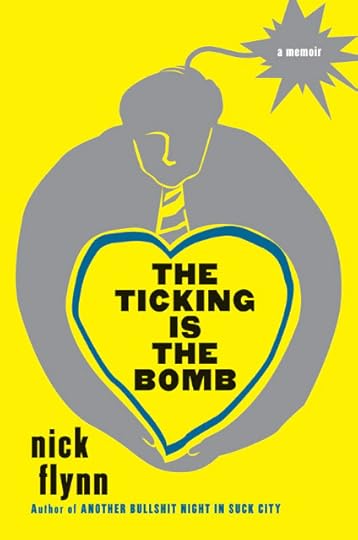 From Huffington Post
From Huffington PostMemoir is an explosive cultural phenomenon. According to Neilsen Bookscan, which tracks about seventy percent of U.S. book sales, total sales of memoirs increased four hundred percent between 2004-2008. In 2007 and 2008, in England, seven of the top ten best selling hard covers were memoirs. All this success, which shows no sign of wavering, begs the question: what's with all these memoirs?
In a posting on the Daily Beast, Taylor Antrim, author of the novel The Headmaster Ritual, not only asks this question but also asks, "Are they [memoirs] somehow... easier?" Antrim pokes a literary sword at two new memoirs, Happy by Alex Lemon and The Ticking Is the Bomb by Nick Flynn, suggesting that all memoir writing -- including the writing in these two books -- is cheating: "Too often, memoir seems to me an excuse to be fragmentary, incomplete, narratively non-rigorous." What he's saying ultimately is, "Why don't these guys just write novels instead?" First, as a four-time memoirist, these books are not easy to write and certainly not "easier" than a novel. I can say this because I have also written three novels and did so in order to take a holiday from the emotional rigors of memoir writing.
 Mary Karr, author of three memoirs, including the recent Lit, concurs. In The Paris Review, Karr was asked if writing The Liars' Club was difficult. "Awful," Karr said. "The emotional stakes a memoirist bets with could not be higher, and it's physically enervating. I nap on a daily basis like a cross-country trucker."
Mary Karr, author of three memoirs, including the recent Lit, concurs. In The Paris Review, Karr was asked if writing The Liars' Club was difficult. "Awful," Karr said. "The emotional stakes a memoirist bets with could not be higher, and it's physically enervating. I nap on a daily basis like a cross-country trucker."
The suggestion that memoir be something it is not, that is, fiction instead, isn't novel. Since the emergence of the genre, there have been heated debates that demand memoir be classified as journalism or even autobiography. Ben Yagoda, author of Memoir: A History, is contemptuous of memoir for its lack of what he calls accountability; he insists on interchanging "memoir" with "autobiography" as a way to support his conclusion: "The past four decades will probably be remembered as the golden age of autobiographical fraud."
Memoir has been called misleading, fraudulent, overly confessional and now is also deemed narratively non-rigorous and too easy to write. I.e.: Why don't you just write fiction instead?
And still, the stunning success of the genre and its ongoing rise in the marketplace and in the hearts of readers means this renegade genre isn't going away.
Rather than wondering "What's with all the memoirs?" we might make peace with the genre and ask, "What is memoir and how are we to read it?"
Michael Gladwell of the New Yorker says it nicely:
Memoir is a genre in need of an informed readership. What the memoirist owes the reader is the ability to persuade him or her that the narrator is trying, as honestly as possible, to get to the bottom of the experience at hand.
From my view, memoir is, most simply stated, memory. It is a given that memory isn't factual or accurate, nor should anyone claim it to be. We all know the debate of the six people who witnessed the same car accident and had differing versions. Memory is personal to the perceiver and to explore memory -- in the form of memoir writing -- is to explore a personal truth of perception.
Life in a memoir is not like life in a novel. Life in memoir is real life (or as real as the writer can attempt to tell). Like life, memoir cannot be expected to hold itself together with the same literary connective tissue as that applied in a novel. Life, at its most true expression, is a series of fragments, moments, memories, dreams, perceptions, lies and stabs at truth. More, life is a gathering of experience, from which we glean our deepest wisdoms about how to be alive. Memoir writing about life is the active process of separating the slag from the gold, which the reader gets to witness -- if they are paying attention.
In Reality Hunger, David Shields writes:
What happened to the writer isn't what matters; what matters is the larger sense that the writer is able to make of what happened.
One reads and absorbs memoir -- not as a fiction aficionado or with a jaded eye that's ready to spot distortions of truth -- but with a feeling state that, if the memoirist is doing her job, has the reader struggling too. Memoir is a form of writing that takes the narrator deep into the interior of the soul and has that narrator (and thus the reader by voyeuristic association) emerge changed by that struggle. Memoir is meatier than a novel when considered in this raw light. Memoir is, at its best, the heroic journey of a writer courageous enough to walk, fall and even crawl toward understanding on the page.



